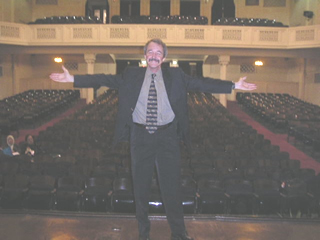Multiliteracies for Social Networking and Collaborative Learning Environments
|

|
Description
A multiliterate teacher understands the many ways that technology interacts and intertwines with academic and interpersonal life, and actively learns how to gain control over those aspects impacting teaching, social, and professional development. Multiliterate individuals are aware of the pitfalls inherent in technology while striving for empowerment through effective strategies for first discerning and then taking advantage of those aspects of changing technologies most appropriate to their situations. These strategies include managing, processing, and interpreting a constant influx of information, filtering what is useful, and then enhancing the learning environment with the most appropriate applications.This session seeks to heighten awareness of these considerations.
Objectives
Participants will develop an awareness of what multilteracies signifies and what it means to be connected as a functioning node in a distributed learning network, or if you prefer as a contributing member of a community of practice. Participants will develop skills in using the online Web 2.0 tools of multiliteracies, and will hone an awareness of the implications of these tools to education, to society at large, and to their own professional development.
Target audience
Teachers and other educators seeking to maximize potential benefits of working within distributed learning networks to increase their opportunities for learning from peers of whatever knowledge they wish to acquire. For the purposes of this course, that knowledge focused on would be the tools and mechanisms for promoting the dissemination of knowledge through such socially driven learning networks. The strategies and heuristics modeled in using the tools would be applicable to whatever content the teachers needed to work with, be it applicable to language learning, some other content area, or project management at the administrative level.
Interest Section
CALL-IS
Weekly content
Week 1
This week gathers the participants into a distributed learning network that overlaps with other existing such networks. Several essential frameworks underpinning multiliteracies are discussed, and these frameworks are applied to models of how this course might function (more as a seminar where knowledge is built through connecting sharing as opposed to a course where the learning paths have been prescribed). Many tools are introduced which participants can use to foster connections with one another. The materials and tools can be sampled and trialed as needed; there is no need to do everything suggested here. Participants are encouraged to keep blogs or wikis to record their progress through the course and discoveries made, and ways of sharing knowledge with one another will be touched on.
Week 2
This week introduces a thorough discussion of the key concepts tagging, RSS, folksonomies, and aggregation. Example implementations using these concepts for language learning are introduced, and techniques and tools for aggregation of content on the web are explored. Participants are expected to tag and configure their blogs and other web artifacts associated with this course in a way that their content can be aggregated by other participants here.
Week 3
This week we explore blogging in its permutations microblogging and podcasting. Particiapants are encouraged to try their hand at these tools, develop their personal distributed learning networks, and consider how they can be expanding their personal learning record from blogging to documenting their progress in formats approaching e-portfolios.
Week 4
This week we focus more thoroughly on the tools of connectivist knowledge and discern patterns in what makes these tools facilitative of enhancing knowledge in distributed learning networks. Some of these tools filter into a container we currently call 'digital storytelling' and we'll look at these tools in particular and think of ways of using them in developing our e-portfolios.
Week 5
And now for something complEATly different. The concept of edupunk suggests that there are issues regarding new technologies not being addressed by institutional learning, and it also suggests an 'in your face' approach to resolving some of these issues by stepping around the established authority and just doing it. This week we'll consider what some of these ill-addressed issues are, and we'll ask: when is it justified to simply take off on one's own tangent on the assumption that this is best for one's students? What are the up and downsides to such an approach? In what way is this a multiliteracies issue? Participants should enjoy addressing the question: Do you feel that you, or anyone for that matter, is, are, or should be an edupunk?
Week 6
This is a week for reflection and consolidation. We intend to put here issues that come up during the first 5 weeks and address them in the context of critical and rhetorical multiliteracies, from Selber, S. (2004). Multiliteracies for a digital age. Southern Illinois University Press. Of course, our participants might have other ideas. In that case, we'll go with the flow.
See the complete syllabus outline at: http://goodbyegutenberg.pbwiki.com/Syllabus_Outline
Moderators

Vance Stevens teaches computing at Petroleum Institute in Abu Dhabi. After a 20-year career in English language teaching, usually as CALL specialist and coordinator, he worked in software development in California as educational technology consultant, before returning to the Middle East as ed tech coordinator for a language school in Abu Dhabi. There he founded the online community Webheads resulting in involvement in many community-based online professional development endeavors which have formed the basis of his professional development life this past decade.

Nelba Quintana
Currently at National University of La Plata, Argentina, I have experience developing and managing on line courses as well as designing tools which facilitate the integration of technology to the learning process.
At present I coordinate TEACHNET - an innovative company of consultants specialising in online learning and teaching in education. Our aim is to help companies and education institutions implement instructional technology, design online courses and seminars, and train educators in online teaching and learning.
I am aWebhead member and ARCALLfounder member.

Doris Molero, Universidad Rafael Belloso Chacin, Maracaibo, Venezuela
EFL Professor at Universidad Dr. Rafael Belloso Chacin in Maracaibo Venezuela. Currently pursuing a doctorate in Sciences of Education specializing in curriculum and instruction at URBE (scheduled to finish in 2009). Her doctoral research is based on the use of web 2.0 tools as multiliterate agents in the EFL Class at university level. Holds a master degree on Educational Informatics (2002) and graduated from Modern Language School at Universidad del Zulia (1991). Have taught English as a foreign language to high school and adult learners for 19 years.
More information: http://www.wikieducator.org/User:Doris3m#Profile
- Sitio web: http://www.blogeandoencienciasdelaeducacion.blogspot.com

Jennifer Verschoor graduated from St. Andrews Scot’s School in Argentina. Holds degrees as English University Professor, Bachelor in Educational Management and English Public Translator. Her emphasis in training teachers to integrate technology into the classroom started five years ago. Since then has given numerous workshops on the integration of New Technologies in Education. Currently she is introducing New Technologies for the Teaching of English in various Leading Commercial and Educational Organizations and also coordinates Peer Coaching sponsored by Microsoft. She is the Director of Teachnet a company specialized in the use of Information and Communication Technology (ICT) in language teaching. She has participated in many online international projects, and currently is involved with Global Partners Junior provided by IEARN.
with
João Alves - Liaison with Images4Education
Dennis Oliver - Greeter and Navigator
Communication Tools
Yahoo Group for email list: http://tech.groups.yahoo.com/group/multilit/
Course Portal: http://goodbyegutenberg.pbwiki.com/
Wiki syllabus: http://goodbyegutenberg.pbwiki.com/Syllabus_Outline
Sandbox wiki: http://havingalookatmultiliteracies.pbwiki.com
Sandbox blog: http://havingalookatmultiliteracies.blogspot.com/
Other tools will be introduced during the course of the session.
Join this session
|
To join this group:
- Go to: http://tech.groups.yahoo.com/group/multilit/
- Click on the blue button:
 (This is just an image). The real button is on the Yahoo Group. If you don´t have a Yahoo ID, you will be prompted to create one (it is free). (This is just an image). The real button is on the Yahoo Group. If you don´t have a Yahoo ID, you will be prompted to create one (it is free).
- Follow the instructions
|
| Note: When you register for the group, you will have to be approved by the moderator. In order to reduce the possibility of "unwanted" members (such as spammers), please be sure to fill out your profile. |
Back to Call for Participation
The Electronic Village Online is a project of TESOL's CALL Interest Section.

Teachers of English to Speakers of Other Lang
Comments (0)
You don't have permission to comment on this page.